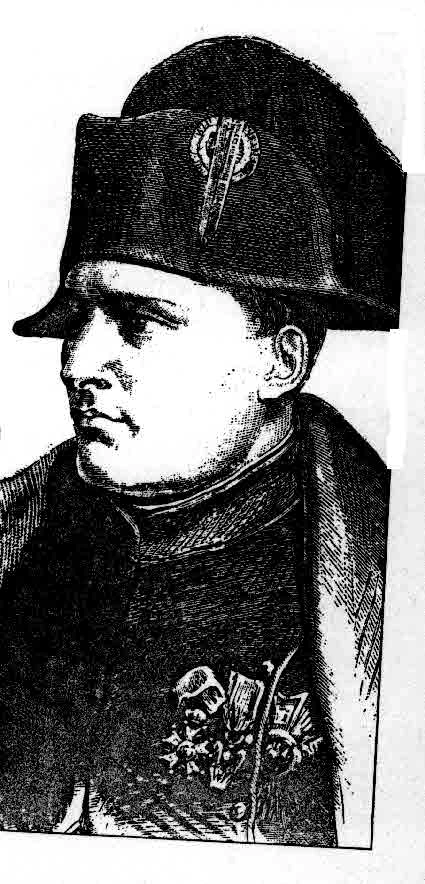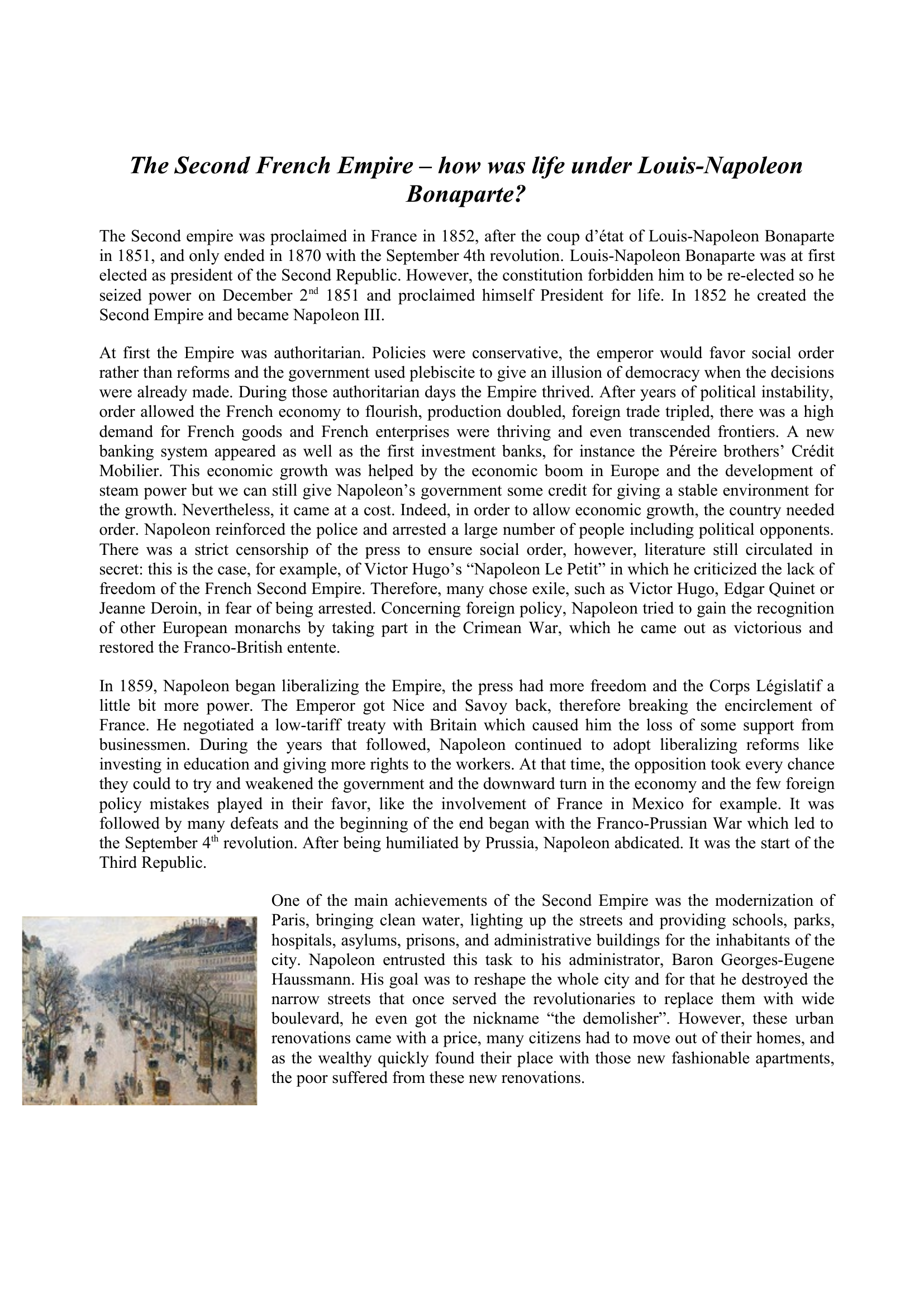how was life under Louis-Napoleon Bonaparte?
Publié le 13/02/2022

Extrait du document

«
The Second French Empire – how was life under Louis-Napoleon
Bonaparte?
The Second empire was proclaimed in France in 1852, after the coup d’état of Louis-Napoleon Bonaparte
in 1851, and only ended in 1870 with the September 4th revolution.
Louis-Napoleon Bonaparte was at first
elected as president of the Second Republic.
However, the constitution forbidden him to be re-elected so he
seized power on December 2 nd 1851 and proclaimed himself President for life.
In 1852 he created the
Second Empire and became Napoleon III.
At first the Empire was authoritarian.
Policies were conservative, the emperor would favor social order
rather than reforms and the government used plebiscite to give an illusion of democracy when the decisions
were already made.
During those authoritarian days the Empire thrived.
After years of political instability,
order allowed the French economy to flourish, production doubled, foreign trade tripled, there was a high
demand for French goods and French enterprises were thriving and even transcended frontiers.
A new
banking system appeared as well as the first investment banks, for instance the Péreire brothers’ Crédit
Mobilier.
This economic growth was helped by the economic boom in Europe and the development of
steam power but we can still give Napoleon’s government some credit for giving a stable environment for
the growth.
Nevertheless, it came at a cost.
Indeed, in order to allow economic growth, the country needed
order.
Napoleon reinforced the police and arrested a large number of people including political opponents.
There was a strict censorship of the press to ensure social order, however, literature still circulated in
secret: this is the case, for example, of Victor Hugo’s “Napoleon Le Petit” in which he criticized the lack of
freedom of the French Second Empire.
Therefore, many chose exile, such as Victor Hugo, Edgar Quinet or
Jeanne Deroin, in fear of being arrested.
Concerning foreign policy, Napoleon tried to gain the recognition
of other European monarchs by taking part in the Crimean War, which he came out as victorious and
restored the Franco-British entente.
In 1859, Napoleon began liberalizing the Empire, the press had more freedom and the Corps Législatif a
little bit more power.
The Emperor got Nice and Savoy back, therefore breaking the encirclement of
France.
He negotiated a low-tariff treaty with Britain which caused him the loss of some support from
businessmen.
During the years that followed, Napoleon continued to adopt liberalizing reforms like
investing in education and giving more rights to the workers.
At that time, the opposition took every chance
they could to try and weakened the government and the downward turn in the economy and the few foreign
policy mistakes played in their favor, like the involvement of France in Mexico for example.
It was
followed by many defeats and the beginning of the end began with the Franco-Prussian War which led to
the September 4th revolution.
After being humiliated by Prussia, Napoleon abdicated.
It was the start of the
Third Republic.
One of the main achievements of the Second Empire was the modernization of
Paris, bringing clean water, lighting up the streets and providing schools, parks,
hospitals, asylums, prisons, and administrative buildings for the inhabitants of the
city.
Napoleon entrusted this task to his administrator, Baron Georges-Eugene
Haussmann.
His goal was to reshape the whole city and for that he destroyed the
narrow streets that once served the revolutionaries to replace them with wide
boulevard, he even got the nickname “the demolisher”.
However, these urban
renovations came with a price, many citizens had to move out of their homes, and
as the wealthy quickly found their place with those new fashionable apartments,
the poor suffered from these new renovations..
»
↓↓↓ APERÇU DU DOCUMENT ↓↓↓
Liens utiles
- NAPOLEON III, Louis Napoléon Bonaparte (20 avril 1808-9 janvier 1873) Président de la République (1848-1852) Empereur des Français (1852-1870) Fils du roi de Hollande, Louis Bonaparte, et d'Hortense de Beauharnais, il est le neveu de Napoléon Ier.
- NAPOLEON III, Louis Napoléon Bonaparte (20 avril 1808-9 janvier 1873) Président de la République (1848-1852) Empereur des Français (1852-1870) Fils du roi de Hollande, Louis Bonaparte, et d'Hortense de Beauharnais, il est le neveu de Napoléon Ier.
- NAPOLEON III, Louis Napoléon Bonaparte (20 avril 1808-9 janvier 1873) Président de la République (1848-1852) Empereur des Français (1852-1870) Fils du roi de Hollande, Louis BonaparteF259D, et d'Hortense de BeauharnaisF217C, il est le neveu de Napoléon IerF227.
- DIX-HUIT BRUMAIRE DE LOUIS BONAPARTE (LE), Karl Marx - résumé de l'œuvre
- HISTOIRE DE JULES CÉSAR. (résumé) de Charles-Louis-Napoléon Bonaparte




